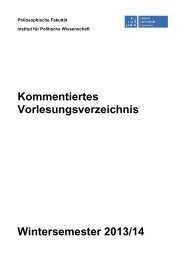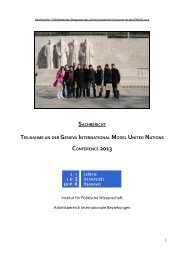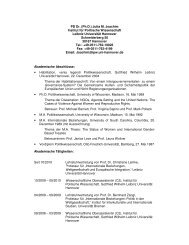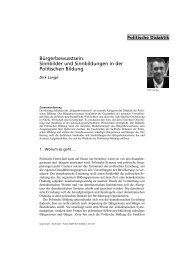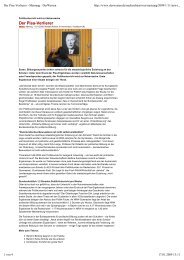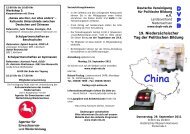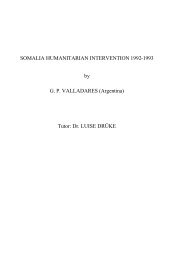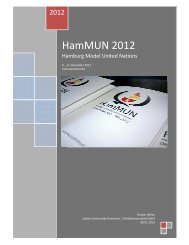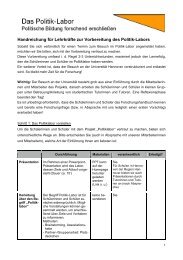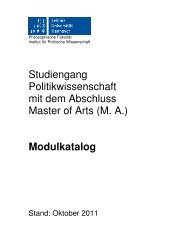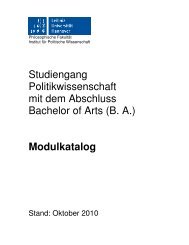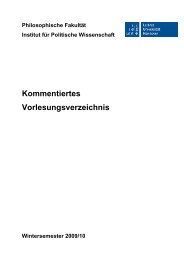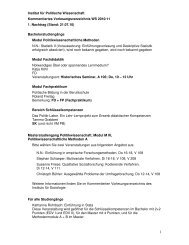Preventive Action for Refugee Producing Situations
Preventive Action for Refugee Producing Situations
Preventive Action for Refugee Producing Situations
You also want an ePaper? Increase the reach of your titles
YUMPU automatically turns print PDFs into web optimized ePapers that Google loves.
46 Chapter 2<br />
international intervention from the time of first indication of a possible<br />
outflow to the long-term development work <strong>for</strong> the period after the exodus<br />
has ceased.<br />
An increasing number of governments have begun to recognize that<br />
the consequences of humanitarian crises generating massive refugee flows<br />
are not only a question of human suffering, but can also become a threat<br />
to national or regional security if not dealt with in a timely manner. One<br />
threat to political stability comes from the inability of governments to<br />
absorb unlimited numbers of refugees. Internal constraints in developed<br />
nations, are increasingly hindering the acceptance of an growing number<br />
of asylum seekers from different countries on their territories. In<br />
particular, the massive flows of refugees from Indochina has prompted<br />
governments in the industrialized world to think about new ways of<br />
dealing with humanitarian crises.<br />
Three major initiatives that included provisions <strong>for</strong> containing potential<br />
refugee-producing situations were taken by the international community<br />
through the U.N. during the past two decades. Each of them is briefly<br />
examined below.<br />
2.1.1. The UN Group of Governmental Experts on International<br />
Cooperation to Avert New Flows of <strong>Refugee</strong>s (UN Group).<br />
Following a suggestion to the General Assembly by the Federal Republic<br />
of Germany (FRG) in 1980 to include the item of international cooperation<br />
to avert new flows of refugees on its agenda, the General<br />
Assembly invited governments of member states to <strong>for</strong>ward their<br />
suggestions on this subject to the Secretary-General. On the basis of the<br />
responses he received, the General Assembly adopted a resolution<br />
calling <strong>for</strong> the Secretary-General to appoint a U.N. group of<br />
governmental experts to under-take a comprehensive review of the<br />
problem and present recommendations <strong>for</strong> action. 66<br />
The U.N. Group, comprising experts from twenty-five governments,<br />
presented its final report in May 1986 after 128 meetings. The Group<br />
concluded that the effectiveness of the U.N. System in averting new<br />
refugee flows is seriously diminished because states do not fully observe<br />
the principles of international law. The Group suggested that the General<br />
Assembly should call upon member states to honor their obligations un-<br />
__________________<br />
66 UN GA res. 36/148,16 December 1981.<br />
Empirical Examination 47<br />
der the UN Charter, to use peaceful means of resolving disputes, and to<br />
refrain from pursuing policies that generate new flows of refugees. 67<br />
The UN Group further requested the General Assembly to encourage<br />
the Secretary-General to make full use of his competencies; to give continuing<br />
attention to the question of averting new massive refugee flows;<br />
to ensure that timely and fuller in<strong>for</strong>mation on potential refugeeproducing<br />
problems be available within the Secretariat; to improve coordination<br />
within the Secretariat <strong>for</strong> collecting and analyzing early in<strong>for</strong>mation<br />
on situations that can cause refugee flows; and to help improve<br />
cooperation among the UN organs and specialized agencies and<br />
concerned member states <strong>for</strong> timely and more effective action. 6 »<br />
The Federal Republic of Germany (FRG) had originally envisaged that<br />
this initiative would set out both guidelines <strong>for</strong> the conduct of states 69<br />
and practical preventive measures. The FRG specified such preventive<br />
measures because there was no preexisting mechanism in the U.N. <strong>for</strong><br />
preventive international action to deal with international border-crossing<br />
refugees.<br />
In working on the proposals that the FRG had outlined, the UN Group<br />
found that there was no existing competent institution within the UN<br />
system that could carry out the functions of observation, coordination,<br />
and consultation, which are crucial to preventive action. 70 The Group,<br />
without making a <strong>for</strong>mal recommendation, encouraged the establishment<br />
of such a body. But the Soviet Union and some Western states as well,<br />
especially the U.S. were concerned about creating more U.N. bodies,<br />
which would risk a paralyzing duplication of ef<strong>for</strong>ts. The final result<br />
contributed to the creation of ORCI, whose mandate strictly limits its<br />
functions to carrying out the instructions of the Secretary-General and<br />
the General Assembly.<br />
In its deliberations, the UN Group also took into account, to some extent,<br />
fundamental human rights principles. Even so, observers remained<br />
______________________<br />
67 UN doc. A/41/324, 13 May 1986: Report of the Group of Governmental Experts<br />
on International Co-operation to Avert New Flows of <strong>Refugee</strong>s, Note by the<br />
Secretary-General. (New York, 1986), pp. 16-18.<br />
68 UN DOC. A/41/324,1986, p. 18.<br />
69 Siegwart Böhm, "Grenzüberschreitende Flüchtlingsströme, Präventive Behandlung<br />
im Rahmen der Vereinten Nationen," Vereinte Nationen, 2 (1982), pp.<br />
49-50. Bohm asserted that the foundation of the ten guidelines <strong>for</strong> the conduct<br />
of states are particularly the UN Charter, the Declaration of Human Rights,<br />
and the Declaration on the friendly relations among states.<br />
70 Böhm, "Flüchtlingsströme," p. 50.



